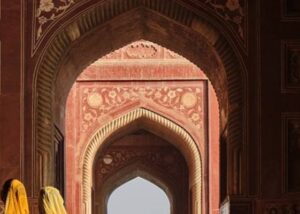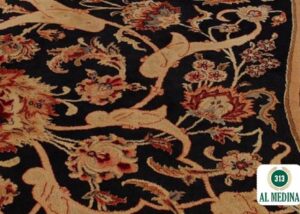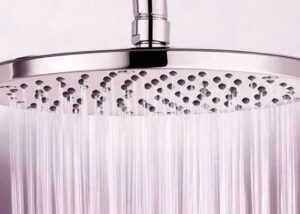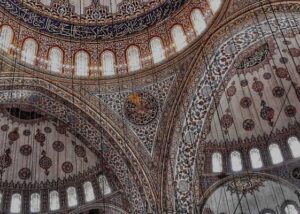Quran
Hadith
Islamic Text
بِسْمِ اللَّهِ الرَّحْمَنِ الرَّحِيمِ
In the Name of Allah Most Merciful Most Kind
Short Answer
Yes, a menstruating woman (i.e., a woman on her period) can enter a Musalla (prayer area) if it is not considered a Masjid. If the prayer area is also a Masjid then it is not permitted.
Hadith
عَائِشَةَ رَضِيَ اللَّهُ عَنْهَا تَقُولُ: جَاءَ رَسُولُ اللَّهِ صَلَّى اللهُ عَلَيْهِ وَسَلَّمَ وَوُجُوهُ بُيُوتِ أَصْحَابِهِ شَارِعَةٌ فِي الْمَسْجِدِ، فَقَالَ: وَجِّهُوا هَذِهِ الْبُيُوتَ عَنِ الْمَسْجِدِ. ثُمَّ دَخَلَ النَّبِيُّ صَلَّى اللهُ عَلَيْهِ وَسَلَّمَ، وَلَمْ يَصْنَعِ الْقَوْمُ شَيْئًا رَجَاءَ أَنْ تَنْزِلَ فِيهِمْ رُخْصَةٌ، فَخَرَجَ إِلَيْهِمْ بَعْدُ فَقَالَ: وَجِّهُوا هَذِهِ الْبُيُوتَ عَنِ الْمَسْجِدِ، فَإِنِّي لَا أُحِلُّ الْمَسْجِدَ لِحَائِضٍ وَلَا جُنُبٍ
(Sayidah) Aishah (May Allah Most High be pleased with her) narrated that the Messenger of Allah ﷺ came and saw that the doors of the houses of his Companions were opening into the Masjid. So he ﷺ said: ‘Turn these houses away from the Masjid.’ The Prophet ﷺ later entered and the people had not done anything. They were hoping that some concession might be revealed. So he ﷺ went to them and said, ‘Turn these houses away from the Masjid. I do not make the Masjid lawful for a menstruating woman, nor for a person in a state a Janabah (major ritual impurity). (Abu Dawood 232, Hasan).
There is a prohibition upon women entering the Masjid during menstruation as seen in the sound Hadith above. However, this prohibition does not extend to all religious spaces. Importantly, it does not extend to a Musalla, which is a prayer area that is not considered to be a Masjid.
Classical Scholars
وليس لها حكم المسجد في حق المرور وحرمة الدخول. (فتاوى قاضيخان)
It (the Musalla) does not carry the ruling of a Masjid with regards to passing (through it) and the prohibition of entering it. (Imam Qadi Khan, Fatawaa Qadi Khan).
يحرم بالحيض والنفاس دخول مسجد
قوله: “دخول مسجد” شمل الكعبة دون مصلي عيد وجنازة في الأصح. (حاشية الطحطاوي على مراقي الفلاح)
Imam al-Shurunbulali: Entering a Masjid is prohibited due to menstruation and lochia (post-natal bleeding).
Imam al-Tahtawi: His saying ‘Entering a Masjid’ includes the Ka’bah, but not the Musalla (prayer area) of Eid or Janazah. This is the soundest opinion. (Haashiyah al-Tahtawi ala Maraqi al-Falah).
Hanafi scholars have differed, to some degree, over the ruling of a woman in menses being permitted to enter a Musalla space. However, the sound opinion is that she can enter. This opinion is well established in numerous authoritative works of the Hanafi Madhab.
وَاخْتَلَفُوا فِي مُصَلَّى الْعِيدِ وَالْجَنَائِزِ وَالْأَصَحُّ أَنَّهُ لَا يَأْخُذُ حُكْمَ الْمَسْجِدِ وَإِنْ كَانَ فِي حَقِّ جَوَازِ الِاقْتِدَاءِ كَالْمَسْجِدِ لِكَوْنِهِ مَكَانًا وَاحِدًا وَهُوَ الْمُعْتَبَرُ فِي حَقِّ الِاقْتِدَاءِ. (تبيين الحقائق شرح كنز الدقائق)
They differed over the Eid and Janazah Musalah (prayer area). The soundest opinion is that it does not take the ruling of a Masjid although it is like a Masjid with regards to the rulings of following since it is considered to be one place. That is what is considered when it comes to following (the Imam). (Imam al-Zayla’i, Tabyeen al-Haqaaiq).
وكذا في مدرسة ومصلى عيد لأنه ليس لها حكم المسجد في الأصح إلا في جواز الاقتداء وإن لم تتصل الصفوف كذا في ابن أمير حاج والحلبي. (حاشية الطحطاوي على مراقي الفلاح)
Likewise a Madrasah or Musalla Eid. This is because they do not carry the ruling of the Masjid, according to the soundest opinion. The exception is the issue of following (the Imam in prayer) even if the rows are not connected. This has been mentioned by Ibn Amir al-Haaj and al-Halabi. (Imam, al-Tahtawi, Haashiyah al-Tahtawi ala Maraaqi al-Falah).
يَمْنَعُ الْحَيْضَ دُخُولَ الْمَسْجِدِ وَكَذَا الْجَبَّانَةُ وَخَرَجَ بِالْمَسْجِدِ غَيْرُهُ كَمُصَلَّى الْعِيدِ وَالْجَنَائِزِ وَالْمَدْرَسَةِ وَالرِّبَاطِ فَلَا يَمْنَعَانِ مِنْ دُخُولِهَا، وَلِهَذَا قَالَ فِي الْخُلَاصَةِ الْمُتَّخَذُ لِصَلَاةِ الْجِنَازَةِ وَالْعِيدِ الْأَصَحُّ أَنَّهُ لَيْسَ لَهُ حُكْمُ الْمَسْجِدِ، وَاخْتَارَ فِي الْقُنْيَةِ مِنْ كِتَابِ الْوَقْفِ أَنَّ الْمَدْرَسَةَ إذَا كَانَ لَا يَمْنَعُ أَهْلُهَا النَّاسَ مِنْ الصَّلَاةِ فِي مَسْجِدِهَا فَهِيَ مَسْجِدٌ. (البحر الرائق شرح كنز الدقائق)
Menstruation prevents one from entering a Masjid. Likewise a Jabanah. The mention of a Masjid excludes other than it. For example an Eid Musalla, Janazah (Musalla), Madrasah or Ribaat. Therefore, they (menses and lochia) do not prevent entry to these places. For this reason, he said in al-Khulasah: the area assigned to Janazah and Eid prayers does not carry the ruling of a Masjid according to the soundest opinion. In al-Qunyah, the section on Waqf, he said: if the authorities of the Madrasah do not prevent people from prayer in it then it is a Masjid. (Imam Ibn Nujaym, al-Bahr al-Raiq).
As seen in the Nusoos (texts) above, it is permissible for a menstruating woman to enter a Musalla. This is because the Musalla does not carry the rulings of a Masjid. Therefore, women are not prohibited from entering during menses. However, there is one ruling that a Masjid and Musalla share. Namely, the ruling of prayer being valid even if the rows are disconnected.
(وَيَحْرُمُ بِالْحَدَثِ) (الْأَكْبَرِ دُخُولُ مَسْجِدٍ) لَا مُصَلَّى عِيدٍ وَجِنَازَةٍ وَرِبَاطٍ وَمَدْرَسَةٍ، ذَكَرَهُ الْمُصَنِّفُ وَغَيْرُهُ فِي الْحَيْضِ وَقُبَيْلِ الْوِتْرِ، لَكِنْ فِي وَقْفِ الْقُنْيَةِ: الْمَدْرَسَةُ إذَا لَمْ يَمْنَعْ أَهْلُهَا النَّاسَ مِنْ الصَّلَاةِ فِيهَا فَهِيَ مَسْجِدٌ
(قَوْلُهُ: لَا مُصَلَّى عِيدٍ وَجِنَازَةٍ) فَلَيْسَ لَهُمَا حُكْمُ الْمَسْجِدِ فِي ذَلِكَ وَإِنْ كَانَ لَهُمَا حُكْمُهُ فِي صِحَّةِ الِاقْتِدَاءِ وَإِنْ لَمْ تَتَّصِلْ الصُّفُوفُ، وَمِثْلُهُمَا فِنَاءُ الْمَسْجِدِ، وَتَمَامُهُ فِي الْبَحْرِ. (رد المحتار على الدر المختار)
Imam al-Haskafi: Major ritual impurity prohibits entering a Masjid. Not an Eid Musalla, nor Janazah (Musalla), Ribaat or Madrasah. The author mentioned it, as did others in the section on menses before Witr. However, in the Waqf section of al-Qunyah (he said), if the authorities of the Madrasah do not prevent people from prayer in it then it is a Masjid.
Imam Ibn Abideen: His saying: Not an Eid Musalla, nor Janazah. Therefore, they do not carry the ruling of a Masjid regarding that (entry) although they do carry the ruling of following being valid despite the rows being disconnected. Likewise is the courtyard of a Masjid. The complete discussion is in al-Bahr. (Radd al-Muhtaar ala al-Durr al-Mukhtaar).
Imam Ibn Abideen further clarified the above Nass, explaining that there is no prohibition upon a woman in menses entering a Madrasah. Rather, if the Madrasah has a Masjid then she cannot enter the Masjid. However, if the prayer area is a Musalla and not a Masjid then she can enter it too.
كَلَامَ الْقُنْيَةِ فِي مَسْجِدِ الْمَدْرَسَةِ لَا فِي الْمَدْرَسَةِ نَفْسِهَا؛ لِأَنَّهُ قَالَ الْمَسَاجِدُ الَّتِي فِي الْمَدَارِسِ مَسَاجِدُ؛ لِأَنَّهُمْ لَا يَمْنَعُونَ النَّاسَ مِنْ الصَّلَاةِ فِيهَا، وَإِذَا غُلِقَتْ يَكُونُ فِيهَا جَمَاعَةٌ مِنْ أَهْلِهَا. اهـ. وَفِي الْخَانِيَّةِ دَارٌ فِيهَا مَسْجِدٌ لَا يَمْنَعُونَ النَّاسَ مِنْ الصَّلَاةِ فِيهَا، إنْ كَانَتْ الدَّارُ لَوْ أُغْلِقَتْ كَانَ لَهُ جَمَاعَةٌ مِمَّنْ فِيهَا فَهُوَ مَسْجِدُ جَمَاعَةٍ تَثْبُتُ لَهُ أَحْكَامُ الْمَسْجِدِ مِنْ حُرْمَةِ الْبَيْعِ وَالدُّخُولِ وَإِلَّا فَلَا وَإِنْ كَانُوا لَا يَمْنَعُونَ النَّاسَ مِنْ الصَّلَاةِ فِيهِ. (رد المحتار على الدر المختار)
The statement of al-Kunya was regarding the Masjid of the Madrasah, not the Madrasah itself. Since he said the Masaajid that are in Madrasahs are Masaajid because they do not prevent people from praying in them. If they are locked, then the residents still pray in congregation in them.
(He mentioned) in al-Khaniyah: If there is a house with a Masjid in it, and they do not prevent people from praying in it. When it is locked then the residents pray in congregation. Then it is a congregational Masjid. It carries the rulings of a Masjid, like trade and entry being prohibited. Otherwise it is not the case. (Meaning) if they prevent people from praying in it. (Imam Ibn Abideen, Radd al-Muhtaar).
Conclusion
The prohibition of menstruating women entering the Masjid does not extend to a Musalla. A Musalla is a prayer area that is not considered to be a Masjid.
Such prayer areas (Musalla) are often found in schools, places of work and airports. They are usually referred to as prayer rooms rather than Masaajid. Many Madrasahs (seminaries) opt for a Musalla space rather than a Masjid. This is because there is greater flexibility with Musalla spaces as compared to a Masjid.
And Allah Most High Knows Best.
–Answered by Shaykh Noorud-deen Rashid (13.06.23)






